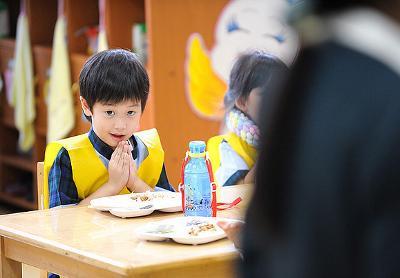From The Opus Dei Newsletter: A new installment in a two-part series on the family.
The family is the forge of a child’s character and personality, and where love for God takes root.
Every child is God’s vote of confidence in the parents, by entrusting to them a son or daughter called to eternal happiness. Faith is the best legacy parents can pass on to their children. It is the only thing that’s truly important, since it is what gives ultimate meaning to our life. And God never gives a mission without providing the means needed to carry it out. That is why no human community is better equipped than the family to ensure that faith takes root in a child’s heart.

Bringing up a child in the Catholic faith involves more than just teaching doctrine; it also requires transmitting a way of life. Although the word of God is effective by itself, to spread it God has wanted to make use of the mediation of human testimony. The Gospel is convincing to others when it is seen lived out. This is especially true with children, who have difficulty distinguishing between what is said and who is saying it—even more so when it’s their father or mother who is speaking. Seeing their own father or mother praying thus has quite special meaning and value for them.
Therefore parents have every advantage in communicating faith to their children. More than words, what God expects is that they be pious and consistent in living the faith. The parents’ personal testimony should be evident at all times, giving example to their children with naturalness, without any show. “Let them see you pray. That’s what I saw my parents do, and it’s engraved on my heart. So when your children reach my age, they will fondly remember their mother and father, who forced them only by their example and smile, giving them doctrine when needed, without pestering them.”[1]
Sometimes children only need to see their parents’ joy after going to confession for faith to take firmer hold in their hearts. The perceptiveness of children should never be underestimated. They know their parents very well, both what’s good about them and what’s not so good, and everything the parents do, or fail to do, is for them a message that positively or negatively affects their development.
Benedict XVI has often stressed that profound changes in institutions and people are usually the result of the saints, not of the learned or powerful: “Amid the vicissitudes of history, it has been the saints who have been the true reformers, who have so often lifted mankind out of the dark valleys into which it constantly runs the risk of sinking back again, and have brought light whenever necessary.”[2]
Something similar happens in families. Certainly, parents need to find the best pedagogical means to pass on the faith, and seek the formation needed to teach it effectively. But the key is the parents’ own effort to attain holiness.

Atmosphere of trust and friendship
We also see the reality today that many young people—especially in their teenage years—weaken in their faith when they are tested. The origin of these crises can vary widely: pressure from a paganized environment, friends who ridicule others’ religious convictions, a teacher who imparts an atheistic viewpoint or denigrates the importance of God. But these crises become serious only if those undergoing them are unable to open up their hearts to the right people for advice.
It is important that parents foster an atmosphere of trust with their children, and always be available to devote time to them. “Children—even those who seem intractable and unresponsive—always want this closeness, this fraternity, with their parents. It is a question of trust. Parents should bring up their children in an atmosphere of friendship, never giving the impression that they do not trust them. They should give them freedom and teach them how to use it with personal responsibility. It is better for parents to let themselves ‘be fooled’ once in a while, because the trust that they have shown will make the children themselves feel ashamed of having abused it—they will correct themselves. On the other hand, if they have no freedom, if they see that no one trusts them, they will always be inclined to deceive their parents.”[4] Nor is there any need to wait until children reach adolescence to put this advice into practice, since it is useful even for very young children.
Having conversations with one’s children, besides being very enjoyable, is the best way to build a real friendship with them. When two people have a relationship of trust, a bridge is created between them that facilitates opening up one’s heart and speaking about one’s worries and concerns, which is also a good way to get to know oneself better. Although it’s true that certain ages are more difficult than others for achieving this closeness, parents should always strive to become “their children’s friends—friends with whom they will be willing to share their anxieties, who will listen to their problems, who will help them in an effective and agreeable way.”[5]
In this atmosphere of friendship, children can hear about God in a pleasant and appealing way. This requires that parents make time to spend with their children, and that it be “quality” time. Children should sense that their parents have a real interest in their concerns, and are even willing to set aside their own concerns for them. Parents therefore need to be ready to turn off the television or computer—or clearly turn their attention away from it—when a son or daughter comes and wants to talk about something that is bothering them. They need to be ready to cut back in the amount of time devoted to work in order to have time to spend with the family; to look for opportunities for leisure-time activities that facilitate conversation between family members, etc.
The mystery of freedom

But this diversity is not an obstacle; rather it broadens educational horizons. On the one hand, it allows education to take place within a personal relationship, far from stereotypes. On the other, the diversity of children’s dispositions and characters fosters a wide variety of educational formats. Therefore, although the path of faith is the most personal path possible, since it involves the deepest core of the human person and one’s relationship with God, we can help each person to undertake it. If in our personal prayer we reflect carefully on each child’s way of being, God will give us the light needed to act effectively.
Transmitting faith, more than a strategy or program, is the effort to help each person discover God’s plan for his or her life. We want to help each one discover on their own what they need to improve in, where they need to change. For it is more than evident that by ourselves we cannot change anyone: others change because they want to.
Some specific points
A number of points that are very important for passing on the faith might be mentioned here. First of all, perhaps, the life of piety within the family, closeness to God in prayer and the sacraments. When parents don’t “hide,” even unintentionally, this area of their life, the relationship with God is manifested by actions that make Him present within the family, in a natural manner that respects the children’s autonomy. Saying grace at meals, reciting with the younger ones morning and evening prayers, teaching them to turn to their guardian angel and to show small signs of affection towards our Lady, are specific ways to foster the virtue of piety in children, giving them resources that can accompany them during their whole life.
Another important means is doctrine. Piety without doctrine is highly vulnerable to the intellectual pressures children will be subjected to throughout their lives. They need a knowledge of apologetics that is both in-depth and practical. Obviously, in this area as well, it’s important to take into account age-specific considerations. Quite often, comments about a current topic or a book will provide a good opportunity to teach doctrine to older children; or it may be they themselves who take the initiative and approach their parents with questions. For younger children, the catechism classes they may receive in the parish or at school are an ideal opportunity for parents to review with them what they have learned, or to teach them in an interesting way certain points of the catechism that may have been omitted. The respect and love parents show for the Church’s teachings will help children understand the importance of studying Jesus’ doctrine.
Another key aspect is helping virtues to take root in children. If piety and doctrine are not accompanied by solid human virtues, children’s thoughts and feelings will end up reflecting the way they live, and not what reason informed by faith dictates to them. Forming virtues requires stressing the importance of self-discipline, hard work, generosity and temperance. For the assimilation of these values raises the human person above mere physical appetites, and makes one more clear-minded, better able to grasp the realities of the spirit. Parents who bring up their children without any real discipline—never saying “no” to them, but instead striving to meet all their expectations—can end up closing the doors to their spirit.
Being condescending towards children in this way, although it might seem to stem from affection, is often really the desire to spare oneself the effort needed to raise children effectively, to set limits on their appetites, to teach them obedience and patience. And since the desires fostered by consumerism are, in themselves, insatiable, falling prey to it leads to a capricious and self-centered lifestyle, a spiral of self-seeking that always entails a deficit of human virtues and of concern for others. Growing up in a world where all of one’s whims are satisfied stifles the spiritual life, and can make self-giving and commitment almost impossible.
Finally, we need to take into account the pressure of today’s environment, for it can be very persuasive. We all know children brought up in a pious family who have been pulled away from the faith by an environment they weren’t prepared to face. Therefore parents need to be very careful about where children are educated, and help create or seek out places that foster growth in the faith and human virtues. The role of parents here is similar to what happens in a garden. We’re not the ones who make plants grow, but we can provide the fertilizer and water that’s needed, and a suitable atmosphere.
St. Josemaria once advised a group of parents: “Don’t hide your piety. Act uprightly. Then they will learn, and your children will be the crown and joy of your maturity and old age.”[6]
A. Aguiló
Footnotes:
[1] St. Josemaria, Get-together, Retamar, Madrid, 28 October 1972.
[2] Benedict XVI, Speech during the prayer vigil at the World Youth Day, Cologne, August 20, 2005.
[3] Conversations with Monsignor Escriva de Balaguer, 103.
[4] Ibid., 100.
[5] Christ is Passing By, 27.
[6] St. Josemaria, Get-together, Pozoalbero, Jerez de la Frontera, 12 November 1972.
If you enjoyed this post, make sure you subscribe to The Faith Explorer RSS feed!
